
Dr. Scott Gottlieb on Finding Cures for Rare Diseases
Former FDA Commissioner Dr. Scott Gottlieb joins ‘Squawk Box’ to discuss the ongoing research and efforts at the FDA to find cures for rare diseases.…
Thought Leader: Scott Gottlieb

May is Asian American and Pacific Islander Heritage Month. Organizations across the United States are paying tribute to “generations of Asian and Pacific Islanders who have enriched America’s history and are instrumental in its future success.” FreightWaves joins in that tribute. An earlier article profiled the U.S. Coast Guard’s Melvin Kealoha Bell.
To continue honoring Americans of Asian and/or Pacific Island heritage, FreightWaves Classics profiles a woman who has accomplished a great deal in a career in both the private sector and in public service.
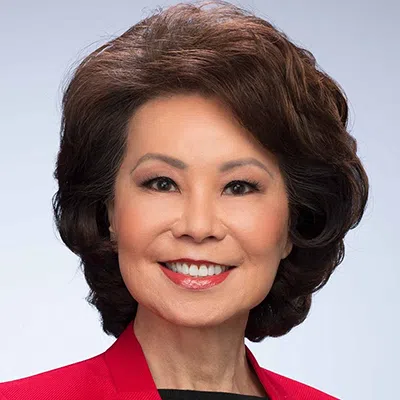
Overview
Elaine Chao is among the very few Americans who has been appointed to two cabinet positions – U. S. Secretary of Labor (by President George W. Bush) and U. S. Secretary of Transportation (by President Donald Trump). When she was unanimously confirmed to her first cabinet post as Secretary of Labor, she became the first woman of Asian American/Pacific Islander heritage to serve in a presidential cabinet.
Earlier in her career, Chao was also President and CEO of United Way of America and Director of the Peace Corps. She previously served as Deputy Secretary of Transportation; Chair, Federal Maritime Commission; Deputy Maritime Administrator; and White House Fellow.
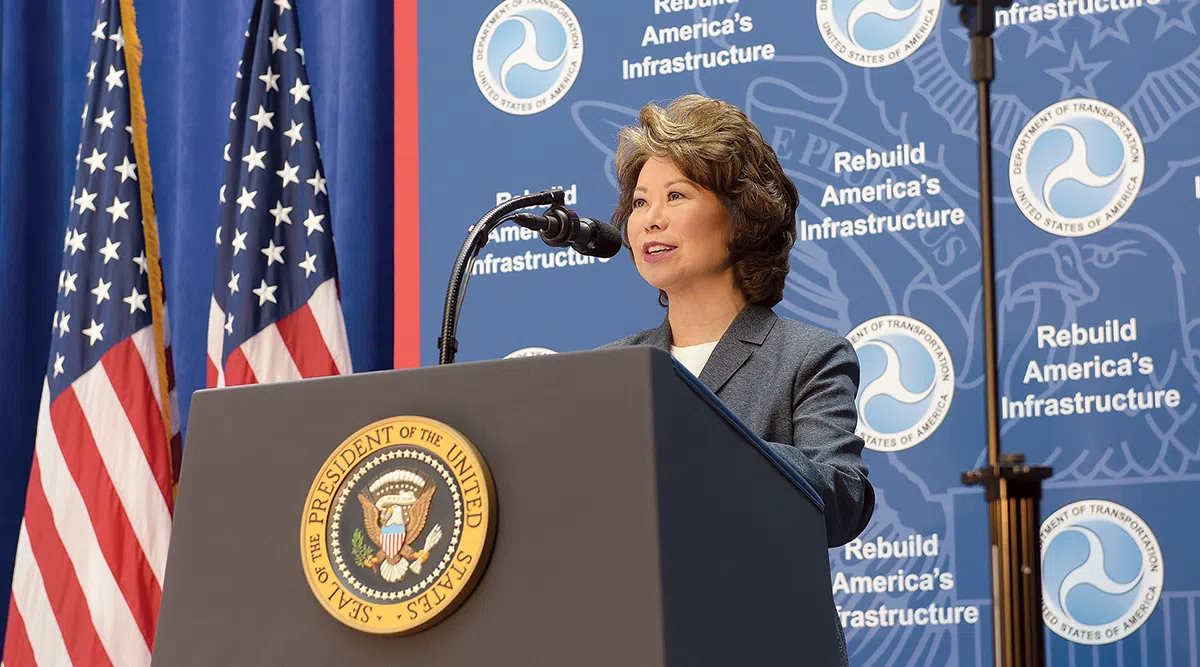
Early life and career
Chao was born in Taipei City, Taiwan in 1953. In 1961, Chao and her family immigrated to the United States. When they moved to the U.S., Chao did not speak English. The family lived on Long Island, and Chao became a naturalized U.S. citizen when she was 19. She earned a bachelor’s degree in economics from Mount Holyoke College in 1975 and her MBA from the Harvard Business School in 1979.
Chao began her career working for several private sector financial institutions. Among her areas of expertise was transportation financing. Her career in public service began when she was appointed a White House Fellow. She was then appointed deputy administrator of the Maritime Administration, an agency of the U.S. Department of Transportation (USDOT), in 1986. She held that position until she was named chairwoman of the Federal Maritime Commission in 1988. Chao was named deputy secretary of transportation at USDOT in 1989.
In 1991, she stepped down from her USDOT position to become director of the Peace Corps. While she was not at the Peace Corps long, she established the agency’s first programs in the Baltic nations and the newly independent states of the former Soviet Union. Chao left the Peace Corps in 1992, when she was named president and chief executive officer of the United Way of America. At the United Way, Chao led the effort to restore public trust and confidence in the premier institution of private charitable giving, after financial mismanagement and abuse was revealed. She worked at the United Way until 1996.
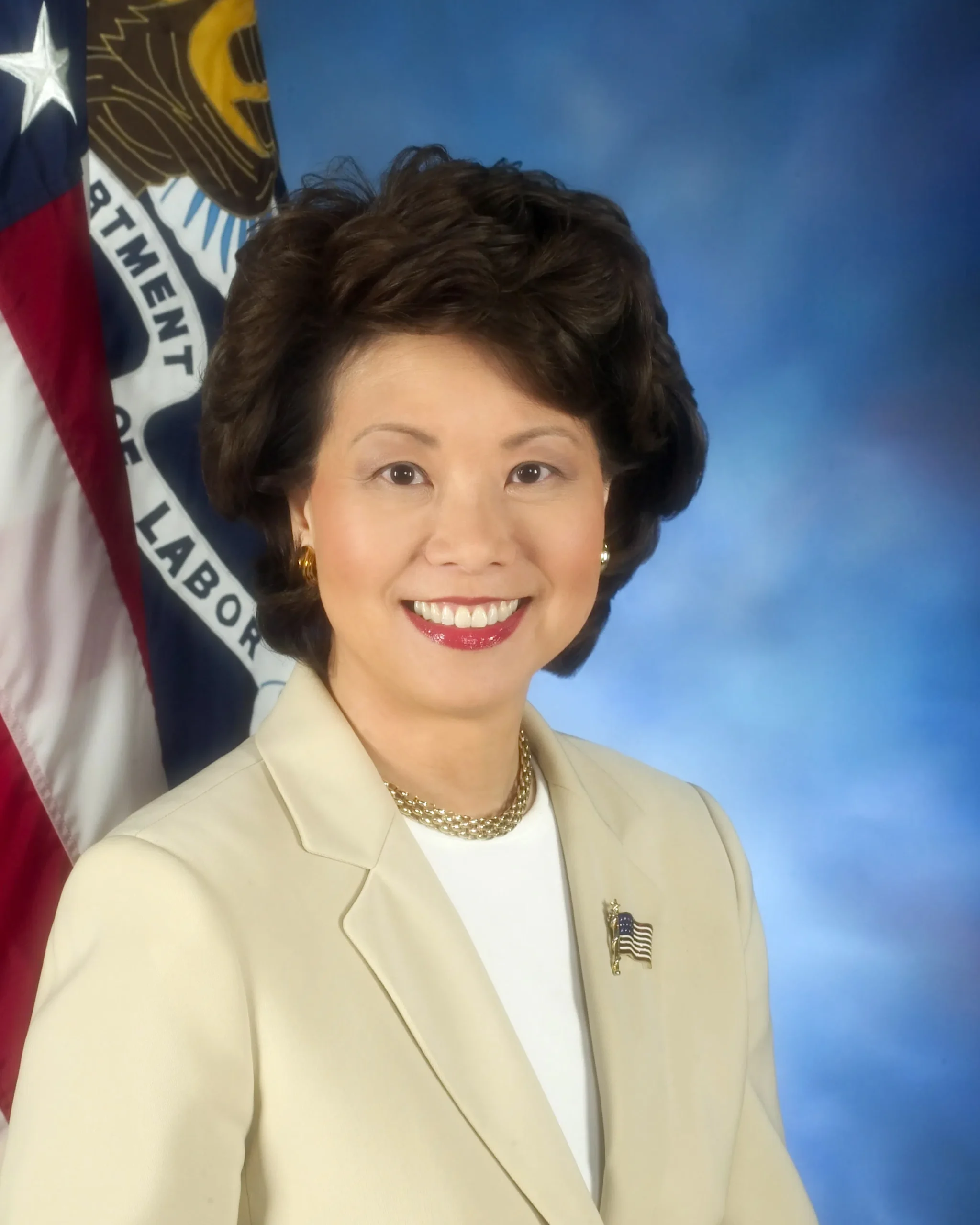
U.S. Secretary of Labor
Chao took office as the U.S. Secretary of Labor on January 29, 2001, and served in that position throughout both terms of President George W. Bush’s presidency (leaving office on January 20, 2009, when the new Obama administration took office). She was the longest-serving Secretary of Labor since World War II.
As the first Secretary of Labor in the 21st century, Chao focused on the competitiveness of America’s workforce and updating department regulations to reflect the modern workplace. During her tenure, “the Labor Department updated white collar overtime regulations that had been on the agenda of administrations since 1977.”
In addition, progress was made in worker protection. Among the milestones of the department were: “record low worker injury, illness and fatality rates; record back wages recovered; record monetary recoveries for workers’ pension plans; and the first major update of union financial disclosure regulations to benefit rank and file members in 40 years.”
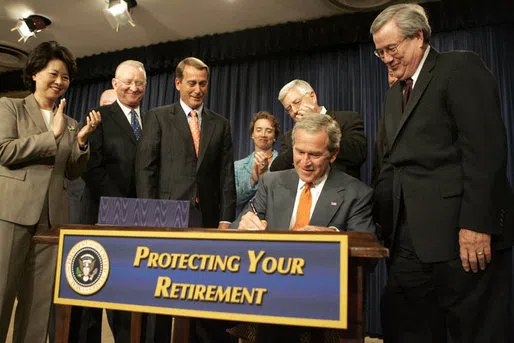
Also during Chao’s tenure the department “updated Family and Leave Act regulations, spearheaded the Pension Protection Act, implemented the MINER Act and crafted new regulations to help energy workers and veterans. In addition, innovative workforce development programs were launched to empower workers to succeed in a knowledge-based economy.”
In summary, as U.S. Secretary of Labor, Chao focused on increasing the competitiveness of America’s workforce in the global economy and promoted job creation opportunities. Under her leadership, the department updated outdated regulations and training programs to empower workers. The department also set “new records for workplace safety and health, compensation and retirement security.”
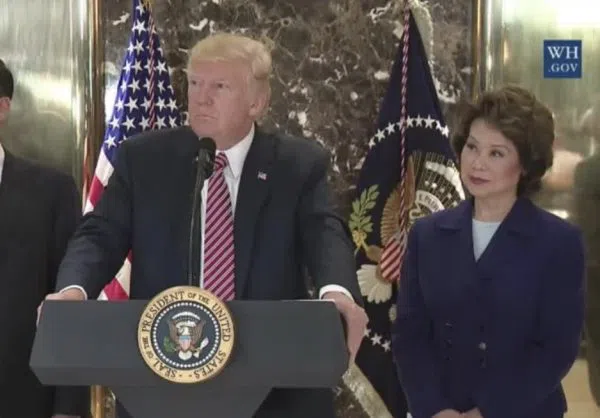
U.S. Secretary of Transportation
On November 29, 2016, President-elect Donald Trump announced that Chao was his choice to serve as U.S. Secretary of Transportation and to lead the USDOT. She was confirmed by the Senate on January 31, 2017, and sworn into office the same day. She served as the 18th secretary of transportation.
Among the duties of the secretary of transportation, he or she is responsible for oversight of “the formulation of national transportation policy and promotes intermodal transportation. Other responsibilities range from negotiation and implementation of international transportation agreements, assuring the fitness of U.S. airlines, enforcing airline consumer protection regulations, issuance of regulations to prevent alcohol and illegal drug misuse in transportation systems and preparing transportation legislation.”
Less than two months after taking office as transportation secretary, Chao spoke at the open house that was held to commemorate the 50th anniversary of the USDOT’s founding. During her remarks, Chao highlighted some of USDOT’s achievements, as well as its ongoing objectives. “In the 50 years since the Department first opened its doors on April 1, 1967, we have seen an amazing transformation of our country’s infrastructure. Change, however, brings many challenges. And the Department of Transportation will be at the forefront of shaping this change, by focusing on the three priorities at the heart of our mission: enhancing safety, refurbishing infrastructure and preparing for the future.”
As U.S. Secretary of Transportation, she was an advocate for safety and the importance of infrastructure and innovation in the economic competitiveness and growth of the United States.
In 2017, the USDOT announced a pilot program to “test and evaluate the integration of civil and public drone operations into the airspace system.” The next year, 10 applicants were selected to participate in the project. Then, in 2019, the Federal Aviation Administration (FAA) “issued an air carrier and operator certificate to UPS Flight Forward for drone deliveries to a hospital campus in Raleigh, North Carolina.” In December 2019, after numerous drone-related incidents, the FAA proposed a new rule to “require drones to be remotely identifiable.”
Chao announced the formation of the Non-Traditional and Emerging Transportation Technology (NETT) Council in March 2019. The council was an internal USDOT group to identify “jurisdictional and regulatory gaps” when the department was considering new transportation technologies. The next month (April 2019), the FAA proposed new regulations to modernize the rules governing commercial space flight launches and reentries. However, at a Congressional hearing on the issue in July 2019, the president of the Commercial Spaceflight Federation criticized the FAA proposal for not delivering on its stated goals.
On January 7, 2021, Chao announced that she would resign as secretary of transportation effective January 11, 2021. (She would have left office on January 20 when the Biden administration came into office.) In a statement, Chao said, “Yesterday, our country experienced a traumatic and entirely avoidable event as supporters of the President stormed the Capitol building following a rally he addressed. As I’m sure is the case with many of you, it has deeply troubled me in a way that I simply cannot set aside.”
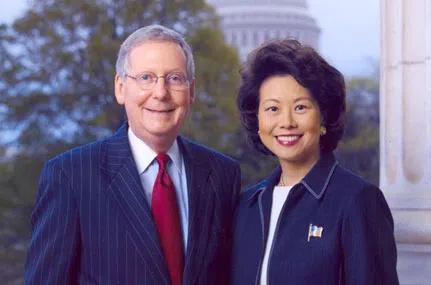
Power couple
In 1993, Chao and U.S. Senator Mitch McConnell, a Republican from Kentucky, were married. McConnell is currently the U.S. Senate Minority Leader, and previously was the Senate Majority Leader.
McConnell and Chao are considered one of Washington’s key power couples. However, their marriage has also meant that both have been targets of those who oppose their politics, policies or positions.
Dr. Scott Gottlieb on Finding Cures for Rare Diseases
Former FDA Commissioner Dr. Scott Gottlieb joins ‘Squawk Box’ to discuss the ongoing research and efforts at the FDA to find cures for rare diseases.…
Thought Leader: Scott Gottlieb
Peter Zeihan: U.S. Navy Seizes Russian Tanker
The US Navy just seized a shadow fleet tanker that managed to slip past the naval quarantine around Venezuela. The tanker reflagged as Russian while…
Thought Leader: Peter Zeihan
Erika Ayers Badan: Surviving Company Failure
In this episode of WORK: Unsolicited Advice, Erika talks through what it really looks like to come out of the worst month of your career…
Thought Leader: Erika Ayers Badan

